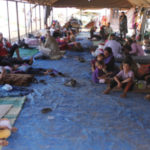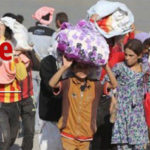Posted: 8/22/03
| Lt. Col. Michael Keller has a cup off coffee at Camp Babylon, actually one of Saddam Hussein's former palaces. |
Plainview man helps bring better health to Iraq
By Jonathan Petty
Wayland Baptist University
CAMP BABYLON, Iraq–Lt. Col. Michael Keller sets foot outside his temporary home in a former presidential palace in Iraq. What meets his eyes isn't pretty. All the windows and doors in the building were broken out or destroyed during the looting and riots that followed in the wake of Operation Iraqi Freedom.
All around him lies destruction from the war and from years of neglect by those previously in charge of Iraq.
But that's not the worst of it. As Keller looks out across the desert, he knows he stands within walking distance of two mass graves–both the result of Saddam Hussein's 30 years of tyranny.
 |
| Keller stands in front of an arch on Eisthar Street in the ancient city of Babylon. The lower portion of the brick wall behind him is part of the original walls of Babylon. In the background is the presidential palace that the troops call home while living at Camp Babylon. |
Visiting that gravesite made an impression on the Army Reserves officer who is married to an art professor at Wayland Baptist University, his alma mater.
“Realizing that where I stood lay thousands of bodies of men, women and children was a horrible sense,” Keller said. “As I stood there, I could see their bones, some with bullet holes in the skull. Men, women, children, entire families lay in this common mass grave. Within these two mass graves lay the remains of approximately 20,000 Iraqis that Saddam executed after the Gulf War. They were executed because they wanted to be free of Saddam's regime.
“It convinced me that Saddam was Iraq's most potent weapon of mass destruction,” he said. “If that alone does not justify the war and the loss of American and coalition soldiers, I do not know what would.”
Hussein's reign has been earmarked by stories of unbelievable cruelty and brutality to his own people. But when a statue of his likeness was toppled by American soldiers in the center of Baghdad, what remained was a country staggering from years of neglect.
“Saddam was a criminal tyrant of a magnitude not seen in the world since Adolph Hitler,” Keller said in an e-mail interview.
Keller has served in the U.S. Army Reserves 16 years, working as full-time military for the past year. He lives in Plainview with his wife, Candace, an art professor at Wayland, where he received his master of business administration degree in 1987.
Keller has no timeline for his return home, but he knows what he is doing is important and necessary. He serves in Iraq as public health chief for the 358th Civil Affairs Brigade in Camp Babylon on the ruins of the ancient city of Babylon.
While the war is officially over, Keller knows there is a long road ahead for the coalition forces and the people of Iraq. Every day, soldiers face the danger of retaliation from Iraqi troops and Saddam supporters. As of July 27, Keller had been through more than 24 scud missile attacks and has had several shots fired in his immediate vicinity.
On several occasions, Keller has had his own weapon locked, loaded and aimed, ready to fire if necessary.
Most people never will know the feeling that comes over a soldier as he prepares to squeeze the trigger, Keller said. “During these times, I find that I often have tunnel vision due to extreme focus and concentration on the situation, yet I'm very calm. It is really all about training and implementing what you have been trained on.”
To date, Keller has not fired a shot, a statistic for which he thanks God.
“I credit the power of prayer for that,” he said.
Even though the conditions have been less than ideal, Keller maintains a positive attitude and said his stay in Iraq hasn't been too bad. While the weather is extremely hot and dry (more than 100 degrees at sunset), and the troops must drink approximately two gallons of water a day to stay hydrated, Keller has yet to spend a night sleeping on the ground thanks to a cot he carries with him.
“Living conditions for me have been good. It is a lot like an extended camping trip where you move sites from time to time,” he said. “I live in Saddam's Babylon Palace, which was looted after coalition forces moved north in the war effort. I guess you could say that I live in the finest house in the Babyl Governate.”
The palace is built on a man-made knoll standing 300 feet high. It doesn't quite have all the comforts of home, however. There is no running water. Drinking water is purified by reverse osmosis and served to the troops by tank trailers known as “water buffalos.” The soldiers bathe with the aid of a solar shower. A generator supplies electricity for the troops, but there is no air conditioning.
“During the looting of the palace, every window was broken out and all the doors were stolen,” Keller said. The result is a mosquito net blanket for protection as he sleeps and a mouthful of sand when it is time to rise.
Still, Keller said the troops' morale is generally good. He has seen the power of the human spirit as people pull together, working toward a common goal.
“The medical community of Iraq worked tirelessly during the initial combat phase of Operation Iraqi Freedom, providing care to the many patients that came through their doors each day, along with the added burden of those who were injured by the war activities,” Keller said. “During this time, virtually all the doctors and nurses worked 24/7 with diminishing supplies and no relief of manpower or supplies in sight.
“Yet those I have talked to worked tirelessly and looked forward to being free of Saddam Hussein's regime and the rampant corruption associated with the Ba'ath Party.”
Since then, U.S. aid has provided millions of doses of vaccines for measles, tuberculosis, hepatitis B, diphtheria, whooping cough, tetanus and polio. Regular immunizations have been established for children. A system has been established to monitor cholera outbreaks. Iraqis have been educated on hygiene and health. Medical clinics have been restored, training has been implemented and essential medical supplies have been restocked.
But the list of things to do far outweighs the list of accomplishments and no one knows for sure how long the rebuilding process will take, Keller said.
“A lot depends on the Iraqi people and their ability to adapt to systems and organizational structures of self governance,” he explained. “Iraq, as a nation, has recently made some great strides in this area, but I believe it will take four to six years for Iraqis to be up and running the country on their own.”













We seek to connect God’s story and God’s people around the world. To learn more about God’s story, click here.
Send comments and feedback to Eric Black, our editor. For comments to be published, please specify “letter to the editor.” Maximum length for publication is 300 words.